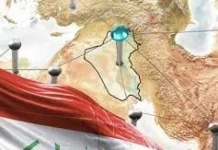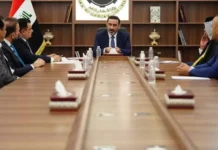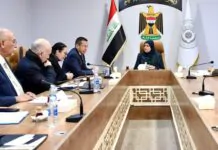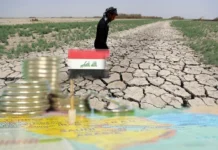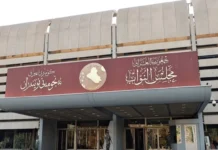Tishwash: Mazhar Saleh: Iraq’s foreign reserves provide exceptional stability for the national currency.
The Prime Minister’s financial advisor, Mazhar Mohammed Salih, confirmed on Friday that the Central Bank of Iraq enjoys substantial foreign reserves that represent the primary backing for the national currency. These reserves are managed within a diversified foreign currency investment portfolio in accordance with the highest standards of global banking efficiency and professionalism.
Saleh added in an interview with Al Furat News Agency that “the ability of these reserves to meet external demand for foreign currency for the purposes of financing import trade is one of the primary indicators of their efficiency,” noting that “the global standard for financing trade from central bank reserves is three months’ coverage, while Iraq has an exceptional capacity of up to twelve months.”
He pointed out that “this level reflects a high degree of stability in the foreign exchange market, despite the temporary pressures on the current account of the balance of payments due to the relative contraction in oil prices,” noting that oil revenues continue to constitute the main pillar in the formation and accumulation of these strategic reserves.
Saleh explained that “the Central Bank largely controls the foreign exchange market by imposing an official exchange rate of 1,320 dinars per dollar for the dinar. This has contributed to keeping the annual inflation rate below 3%, which falls within what is known as the normal range for the general price level or the natural price break-up in the country.”
He emphasized that this represents the highest levels of stability targeted by Iraqi monetary policy. link
************
Tishwash: Al-Sudani discusses with Halliburton the development of Basra fields and the expansion of associated gas investment.
Prime Minister Mohammed Shia al-Sudani received a delegation from the American company Halliburton on Thursday, headed by Shannon Slocum. The two discussed ways to enhance cooperation in the oil and gas sector and develop Iraqi fields using the latest global technologies. The company affirmed its commitment to supporting national cadres and expanding its investments in Basra.
Prime Minister Mohammed Shia al-Sudani received today, Thursday, the President of the American oil and energy technology company Halliburton, Mr. Shannon Slocum, and his accompanying delegation.
Mr. Al-Sudani emphasized that the presence of major oil companies in Iraq reflects the government’s commitment to the country’s energy sector and its efforts to develop it according to modern international standards and through the best energy companies. He emphasized the government’s vision for developing the oil and gas sectors and its commitment to ensuring that development takes place with the highest possible capabilities provided by advanced technology, as well as Iraq’s continued expansion of its use of associated gas and the production of petroleum derivatives.
His Excellency pointed out the importance of expanding the scope of work with Halliburton, given its expertise and capabilities in the fields of extraction and refining, and its possession of modern global technologies. He affirmed his support for the company’s work in developing the Nahr Bin Omar and Sindbad fields in Basra Governorate.
For his part, Mr. Slocum affirmed Halliburton’s interest in operating in Iraq, given the country’s progress across all sectors, its stability, and its openness to major international industrial companies. He explained that the company is committed to providing the latest technological developments for oil and gas fields, after finalizing the contract model.
He also stated that the company will employ modern administrative and technical methods in its work, and is committed to developing the skills of the Iraqi cadres working with it. link
************
Tishwash: A Second Term Hanging by a Thin Thread: Al-Sudani Swings Between Washington and Domestic Allies
Al-Masala: Prime Minister Mohammed Shia al-Sudani faces an early test as he seeks a second term, amid intensifying US pressure to end the influence of armed factions. Meanwhile, these factions insist on remaining a strategic shield in the national security equation.
The scene reveals a complex battle, where domestic considerations intersect with external dictates. The upcoming elections are becoming an indirect battleground for the struggle over the identity of the Iraqi state between the “government centralization” project and the “armed pluralism” project, which constitutes an extension of the post-2003 balance of power.
A report by the American Soufan Institute indicates that the recent clashes in the Dora district of Baghdad have once again highlighted the duality of power between official state institutions and the centers of influence represented by the factions. This reflects the political system’s inability to resolve the debate over who ultimately holds the sovereign decision.
Observers believe that these factions are not merely military arms, but rather a deeply rooted social structure supported by a broad segment of the Shiite community, which still recalls the experience of ISIS’s invasion of large swaths of Iraq in 2014 and the subsequent expansion of the factions as a rescue force in the face of an existential threat.
Al-Sudani’s government is trying to strike a balance between reassuring Washington and its regional partners that Iraq is capable of asserting its security sovereignty, while at the same time avoiding a rupture with the factions, which represent a political pillar within the Coordination Framework, their primary incubator.
The approaching general elections in November require Al-Sudani to carefully consider his options. The continued fragile balance may give him additional time to regroup, but it also increases the risks if Washington decides to increase the pressure or if the factions choose to test their strength on the street.
For Al-Sudani, the battle for a second term appears to hinge on his ability to market himself as a man of possible consensus. However, he realizes that his image as a “statesman” versus a “factionalist” may determine his political future more than the ballot box. link

